ZEN IRODALOM ZEN LITERATURE
« Zen főoldal
« vissza a Terebess Online nyitólapjára
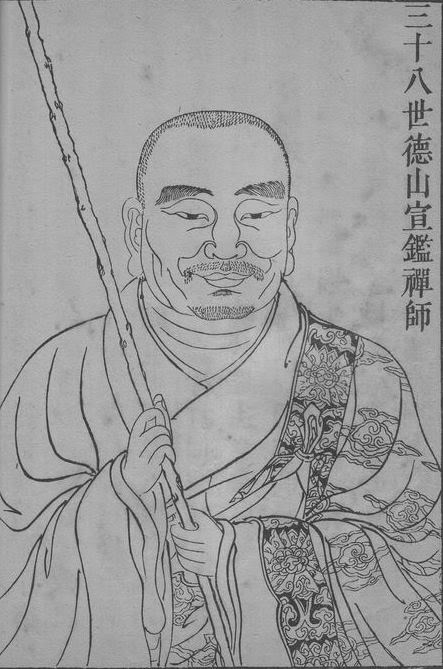
德山宣鑑 Deshan Xuanjian (780/2-865)
(Rōmaji:) Tokusan Senkan
(Magyar:) Tö-san Hszüan-csien
Tartalom |
Contents |
| Tö-san Hszüan-csien mondásaiból Fordította: Terebess Gábor |
Encounter Dialogues of Deshan Xuanjian Outstanding masters in the Lineage of Shih-t'ou: Te-shan |
Encounter Dialogues of Deshan Xuanjian
compiled by Satyavayu of Touching Earth Sangha
DOC: Treasury of the Forest of Ancestors
Master Deshan Xuanjian cane from the northern region of Jianzhou in the far western province of Sichuan. As a young monk he first made extensive studies of monastic discipline, and then turned his attention to studying the “Mind-Only” (Vijnanavada) School of Philosophy, as well as becoming an expert on the Diamond Sutra, a scripture usually associated with the “Middle Way” (Madhyamika) School. He became a respected scholar, and for many years made a career as a lecturing priest. Eventually becoming intrigued by the Zen movement, he traveled to Hunan to seek out a master.
One day during Xuanjian's travels he came across an old woman selling steamed dumplings on the side of the road. Stopping for a rest, he set down his heavy pack and asked the woman for some dumplings. The old woman pointed to the bundles of manuscripts tied to his pack and asked, “Venerable, what is that you're carrying?”
Xuanjian said, “They're commentaries on a scripture.”
The woman asked, “Which scripture are they about?”
Xuanjian said, “The Diamond Sutra.”
The woman said, “I have a question for you. If you can answer, I'll give you some dumplings fir free. But if you can't answer, you'll have to find something elsewhere. Okay?”
Xuanjian said, “Go ahead and ask.”
The woman said, “In the Diamond Sutra it says that the mind of the past can't be grasped, the mind of the future can't be grasped, and the mind of the present can't be grasped, either. So with what mind is the venerable asking for dumplings?”
Xuanjian was speechless.
The old woman then suggested that he seek out Master Longtan Chongxin at the nearby Dragon Pool Temple for guidance. (The old woman had probably been a student of Master Longtan's. The master, because of his humble background as a rice-cake seller, was, perhaps, particularly open to teaching people from all classes and backgrounds). Xuanjian took the advice and headed toward the Dragon Pool.
When he arrived at the temple, Xuanjian sought out Master Longtan, and on first meeting him said, “I've been hearing about the Dragon Pool, but now that I've arrived I see no pool, and no dragon has appeared.”
The master replied, “Ah, you've truly arrived at Dragon Pool.”
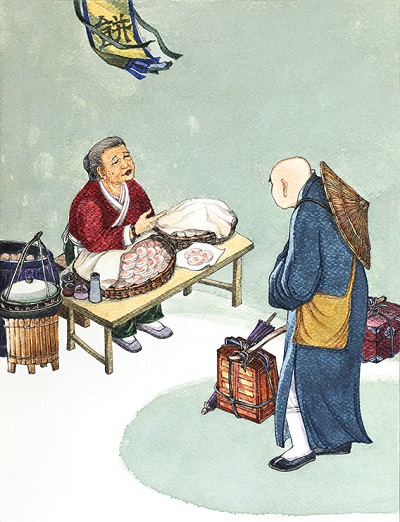
That evening Xuanjian was invited to the abbot's room. He talked extensively about Buddhist philosophy until Master Longtan finally said, “It's getting late. You should go now.” So Xuanjian said good night and stepped outside. But finding it too dark to make his way, he asked the master for a lamp. The master lit a lantern and brought it out, but just as Xuanjian reached out to take it, the master blew it out. At that moment Xuanjian had a deep awakening. He then made a deep bow to the master.
The master said, “What did you see that makes you bow?”
Xuanjian said, “From now on, I'll never doubt the teaching of the venerable master.”
The next morning Xuanjian piled all his scholarly texts in front of the Teaching Hall. Lifting a torch he said, “All these abstract doctrines are like a single hair in vast emptiness. All the affairs of the world are like a drop of water in a boundless ocean.” Then he burned them all.
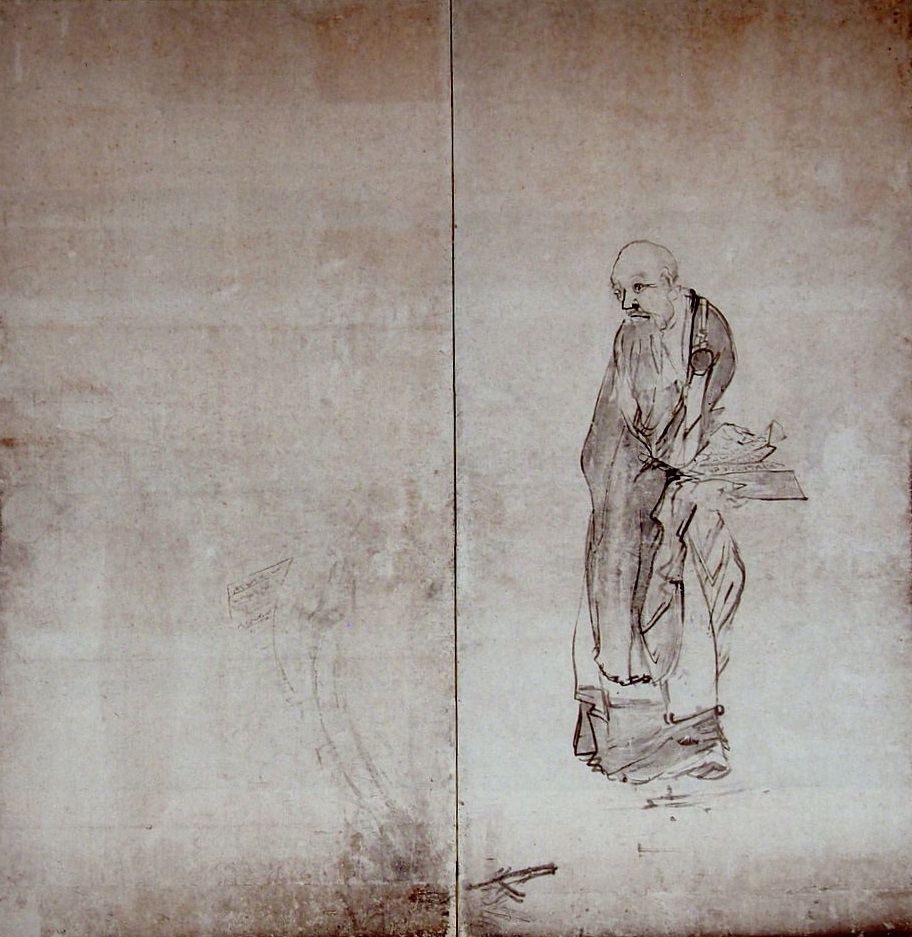 -
-
長澤芦雪 焚経図
禅宗の根本理念の「不立文字」を表しているが、お経を焼いている。
德山宣鑑 Deshan Xuanjian (780/2-865) burning the scriptures
by 長沢芦雪 Nagasawa Rosetsu (1754–1799)
While spending many years with Master Longtan, Xuanjian traveled around the region and met other teachers, receiving guidance particularly from Master Guishan Lingyou. Sometime after the Huichang era persecution came to an end, Xuanjian made an impression on some regional officials, and the Prefect of Wuling in southern Hunan invited him to become the abbot of a newly restored monastery on Virtue Mountain (Deshan). Here he remained as master for the rest of his life, supposedly attracting hundreds of students, and becoming famous for a direct, physical, and even fierce teaching style.
Once a monk asked Master Deshan Xuanjian, “What is awakening?”
Deshan struck him with his staff and said, “”Get out, don't defecate here!”
Then the monk asked, “What is Buddha?”
The master said, “An old beggar in India.”
One day Master Deshan said to the community, “As soon as you ask, you've missed it. If you refrain from asking, you've also missed it.”
Then a monk came forward and made a bow.
The master hit him.
The monk said, “I haven't even asked anything yet. Why did you hit me?”
The master said, “What difference would it make if I'd waited until you spoke?”
When Master Deshan became sick at the end of his life, a monk asked him, “Is there one who is not sick?”
The master said, “Yes.”
The monk asked, “What about the one who is not sick?”
The master moaned, “Uuugh. Uuugh.”
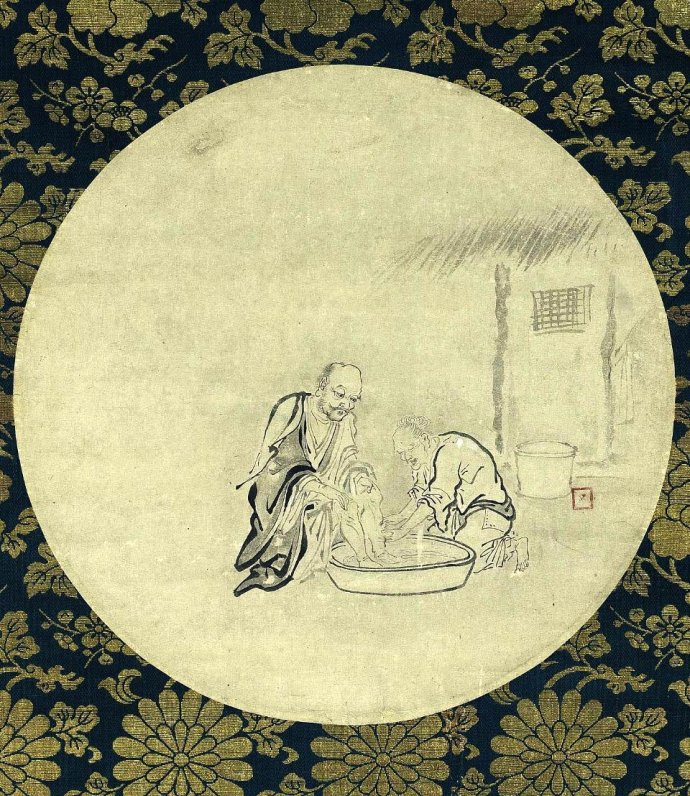
Old woman washing Deshan's feet. 狩野常信 Kanō Tsunenobu (1636-1713)
http://blog.sina.com.cn/s/blog_769fb5f30102uzl7.html
Outstanding masters in the Lineage of Shih-t'ou: Te-shan
by John C. H. Wu
In: The Golden Age of Zen
Taipei : The National War College in co-operation with The Committee on the Compilation of the Chinese Library, 1967, pp. 150-154.
Lung-t'an was instrumental in the conversion of Te-shan Hsüan-chien (780-865). Te-shan, born of a Chou family in Cheng-tu, Szechuan, began early as a member of the Vinaya order, steeped in scriptural learning. He made a special study of the Diamond Sutra on the basis of the learned commentaries of the Dharma master Ch'ing-lung. He lectured on this sutra so frequently that his contemporaries nicknamed him “Diamond Chou.” Later, hearing about the prosperity of the Zen platform in the south, he became indignant and said, “How many homeleavers have spent a thousand kalpas in studying the Buddhist rituals, and ten thousand kalpas in observing all the minute rules of the Buddha. Even then they have not been able to attain Buddhahood. Now, those little devils of the south are bragging of pointing directly at the mind of man, of seeing one's self-nature and attaining Buddhahood immediately! I am going to raid their dens and caves and exterminate the whole race, in order to requite the Buddha's kindness.”
Carrying on a pole two baskets of Ch'ing-lung's commentaries, he left Szechuen for Hunan, where Lung-t'an was teaching. On his way, he encountered an old woman selling pastries, which in Chinese were, and still are, called “mind-refreshers.” Being tired and hungry, he laid down his load and wanted to buy some cakes. The old woman, pointing at the baskets, asked, “What is this literature?” He answered, “Ch'ing-lung's commentaries on the Diamond Sutra.” The old woman said, “I have a question to ask you. If you can answer it, I will make a free gift of the mind-refreshers to you. But if you cannot, please pass on to another place. Now, the Diamond Sutra says: ‘The past mind is nowhere to be found, the present mind is nowhere to be found, and the future mind is nowhere to be found.' Which mind, I wonder, does Your Reverence wish to refresh?” “Te-shan had no word to say, and went on to Lung-t'an. After he had arrived at the Dharma hall, he remarked, “I have long desired to visit the Dragon Pond. Now that I am here on the very spot, I see neither pond nor dragon.” At that time, the master Lungt'an came out and said to him, “Yes, indeed, you have personally arrived at the true Dragon Pond.” Te-shan again had nothing to say. He decided to stay on for the time being. One evening, as he was attending on the master, the latter said, “The night is far advanced. Why don't you retire to your own quarters?” After wishing the master good night, he went out, but returned at once, saying, “It's pitch dark outside!” Lung-t'an lit a paper-candle and handed it over to him. But just as he was on the point of receiving the candle, Lung-t'an suddenly blew out the light. At this point, Te-shan was completely enlightened, and did obeisance to the master. The master asked, “What have you seen?” Te-shan said, “From now on, I have no more doubt about the tongues of the old monks of the whole world.”
Next morning, the master ascended to his seat and declared to the assembly, “Among you there is a fellow, whose teeth are like the sword-leaf tree, whose mouth is like a blood-basin. Even a sudden stroke of the staff on his head will not make him turn back. Some day he will build up my doctrine on the top of a solitary peak.”
On the same day, Te-shan brought all the volumes of Ch'ing-lung's Commentaries to the front of the hall, and, raising a torch, said, “An exhaustive discussion of the abstruse is like a hair thrown into the infinite void, and the fullest exertion of all capabilities is like a little drop of water falling into an unfathomable gulf.” Thereupon he set the commentaries to fire.
This episode is not merely spectacular but profoundly suggestive. It recalls to mind what Lao Tzu has said, “Where darkness is at its darkest, there is the gateway to all spiritual insights.” In the present instance, the night was dark enough, but it became infinitely darker after the candle was lit and blown out again. When all external lights were out, the inner light shone in all its effulgence. But, of course, this did not work automatically. It worked in the case of Te-shan because his mind was just at that moment ready for the enlightenment. The little chick was stirring in the egg and trying to break through the shell; and it took just a peck by the hen on the outside to effectuate the breakthrough.
Te-shan's act of burning the learned commentaries and his realization that all discursive reasonings of the philosophers were no more than a hair in the infinite void should remind us of that St. Thomas Aquinas in his last days said to his secretary who was still urging him to continue his writing: “Reginald, I can do no more; such things have been revealed to me what all the writings I have produced seem to me like a straw.”
Te-shan was by nature a man of fierce intensity. Before he was enlightened, he had clung fiercely to the letter of the scriptures. When he heard of the prevalence of Zen teaching in the south, he became fiercely indignant, breathing threats and murder against those rebellious “devils.”
After his conversion, he became fiercely iconoclastic. Nothing short of the absolutely Real and True could satisfy him; and that he had discovered in the pitch darkness of the happy night, namely, his true Self. Everything else was to him nothing but rubbish. It is in this light that we should read some of his shocking utterances, such as: “I see differently from our ancestors. Here there is neither Patriarch nor Buddha. Bodhidharma is an old stinking barbarian. Shakyamuni is a dry toilet strip. Manjushri and Samantabhadra are dung-heap coolies. Samyak- sambodhi and subtle perception are nothing but ordinary human nature freed of fetters. Bodhi and Nirvana are but dead stumps to tie the donkeys to. The twelve divisions of the scriptures are only registers of ghosts, sheets of paper fit only for wiping the pus from your ulcers and tumors. All the ‘four fruitions' and ‘ten stages' are nothing but demons lingering in their decayed graves, who cannot even save themselves.”
In dealing with his disciples, Te-shan resorted to the rod as frequently as Lin-chi resorted to the shout, as evidenced by the current saying, “Te-shan's rod, Lint-chi's shout.” Once Te-shan announced to his assembly, “If you speak rightly, I will give you thirty blows. If you speak wrongly, I will also give you thirty blows.” When Lin-chi heard about this utterance, he said to his friend Lo-p'u, “Go to ask him why the one who speaks rightly should be given thirty blows. As soon as he begins to strike, catch hold of his rod and push it against him. See what he will do.” Lo-p'u acted accordingly. As soon as he put the question, Te-shan started to strike him, and he caught hold of the rod and made a violent thrust against him. Thereupon, Te-shan returned quietly to his room. When Lo-p'u came back to report to Lin-chi, the latter said, “From the very beginning I have had my doubts about that fellow. Be that as it may, do you recognize the true Te-shan?” As Lo-p'u fumbled for an answer, Lin-chi gave him a beating.
In his last illness, Te-shan still remained the radical nondualist that he was. Someone asked him, “Is there still the one who is never sick?” Te-shan said, “Yes, there is.” “Tell me something about this never-sick one,” the visitor persisted. The master cried, “Oya, oya!” signalling intense pain. The one who is sick is identical with the one who is never sick!
Te-shan had only a few disciples, of whom two stood out: Yen-t'ou Ch'üan-huo (828-887) and Hsüeh-feng I-ts'un (822-908). In spiritual gifts, Yen-t'ou was superior to Hsüeh-feng. Yen-t'ou's mind was sharp as a razor. He never deferred to anyone, not even Te-shan and T'ung-shan. One day, as he came to see Te-shan, no sooner had he stepped into the door than he asked, “Is it holy or profane?” As Te-shan shouted, Yen-t'ou did obeisance. Later, when someone related the incident to T'ung-shan, the latter remarked, “Anyone else than Yen-t'ou would have found it hard to respond so well.” When Yen-t'ou heard of this compliment, he said, “The old man of T'ung-shan is very insensible to have passed such an erroneous judgment. He does not know that on that particular occasion, in acting the way I did, I was uplifting him (Te-shan) by one hand while pinching him by the other hand.”
In asking, “Is it holy or profane?” Yen-t'ou was, of course, referring to that state in which there is no more distinction between the holy and profane. In shouting at the question, Teshan made him understand that he saw eye-to-eye with him. In doing obeisance, he was on the one hand showing his delight at the master's reaction, but on the other hand he was testing how he would react. But poor Te-shan sat like an idol and accepted unsuspectingly a homage which was meant for the merely “holy”!
Tö-san Hszüan-csien összegyűjtött mondásaiból
Fordította: Terebess Gábor
Vö.: Folyik a híd, Officina Nova, Budapest, 1990, 93-98. oldal
Lacza Márta illusztrációja– Késő éjszaka van már – zárta le a vitát Lung-tan [Lung-tan Csung-hszin, 9. sz.] Tö-sannal. – Ideje, hogy visszavonulj a szállásodra.
Tö-san elbúcsúzott, félrehúzta az ajtófüggönyt, de a küszöbről visszafordult:
– Koromsötét van odakint! – mondta.
Lung-tan gyújtott neki egy gyertyát, de amikor Tö-san érte nyúlt, hirtelen elfújta a lángját.
Tö-san egyszerre megvilágosult.
Másnap kicipelte a csarnok elé terjedelmes kommentárjait a Mennykő-szútráról, fáklyát gyújtott, és így szólt:
– Olyanok kimerítő vitáink a homályos dolgokról, mintha a végtelen tág űrbe egy hajszálat vetnénk, és minden képességünk teljes kifejtése, mintha a feneketlen mély öbölbe egy vízcseppet hullatnánk – és Tö-san tűzbe borította a kommentárokat.Jött egy szerzetes, és Tö-san az orrára csapta a kaput. A szerzetes kopogtatott.
– Ki vagy? – kérdezte Tö-san.
– Egy oroszlán!
Tö-san kinyitott, a szerzetes pedig leborult előtte a földre.
– Ó, te fenevad – hágott a nyakába Tö-san –, mit ólálkodsz itt?– Mi a megvilágosulás? – kérdezte egy szerzetes.
– Ide ne piszkíts! – mondta Tö-san.
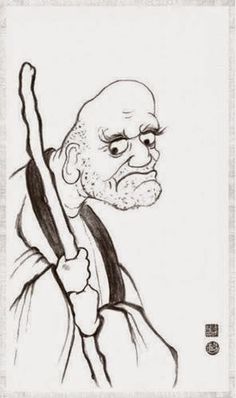
Zensho W. Kopp illusztrációjaTö-san kijelentette a szerzetesek csarnokában:
– Ha szólsz, leverek rajtad harminc botütést, ha nem szólsz, akkor is leverek rajtad harminc botütést.
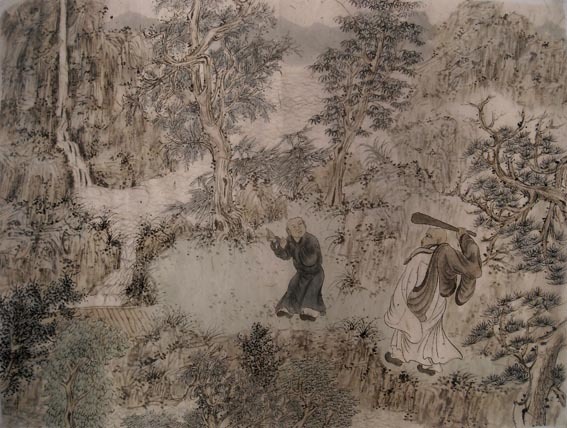
王振羽 Wang Zhenyu (1968-) illusztrációjaEgy koreai szerzetes járult Tö-san elé. A mester rögtön megbotozta.
– Miért versz meg? – kérdezte a szerzetes. – Még nem is kérdeztem semmit.
– Honnan jöttél?
– Koreából.
– Még mielőtt hajóra szálltál volna, már kiérdemelted a harminc botütést.– Ki eszi meg a penészes ételmaradékot? – kérdezte egy szerzetes.
– Egyedül te nem vagy hajlandó – mondta Tö-san.
A szerzetes úgy tett, mintha öklendezne.
– Kísérd ki! – szólt Tö-san a segédjének. – Rosszul lett.
De a szerzetes magától kiment.Lung-ja [Lung-ja Csü-tun, 835-923] kilépett a gyülekezetből, és Tö-san mester elé járult:
– Ha megfenyegetlek, hogy leütöm a fejed a világ legélesebb pallosával, mit teszel? – kérdezte.
Tö-san behúzta a nyakát.
– Már le is vágtam! – mondta Lung-ja.
Tö-san mosolygott.
Lung-ja később meglátogatta Tung-sant, és megemlítette neki az esetet.
– És mit mondott Tö-san? – kérdezte Tung-san.
– Nem mondott semmit.
– Nem mondott semmit? Akkor mutasd a fejét, amit állítólag leütöttél!
Lung-ja most döbbent rá, hogy mellétalált.Tö-san haldoklott.
– Van, aki sosem beteg? – kérdezte egy szerzetes.
– Van.
– Mondj erről a sosem-betegről valamit!
A mester felnyögött válaszul.